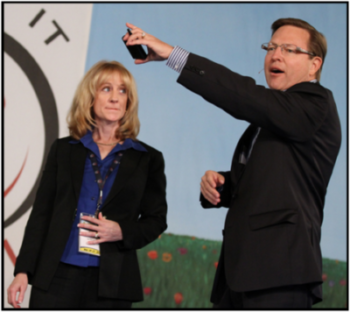During one of our quarterly trips to Nashville, Lliam and I had a unique opportunity to chat and visit one-on-one with Verne Harnish. Verne is the founder of the world-renowned Entrepreneurs’ Organization (EO) and chaired for 15 years EO’s premiere CEO program, the Birthing of Giants and WEO’s Advanced Business executive program both held at MIT. Founder and CEO of Gazelles, a global executive education and coaching company, Verne has spent the past 30 years educating entrepreneurial teams. He is also the Venture columnist for Fortune magazine and the author of Mastering the Rockefeller Habits which is endorsed by more than a hundred CEOs of mid-size companies and is published in Chinese, Japanese, Korean, Russian, Serbian, Polish, Dutch, German and Spanish.
This was a fantastic opportunity and here are the pearls of wisdom he shared with us:
- Great companies don’t often “make it” until they are 25 years or older. Apple and Starbucks, for example, had exponential growth after they turned 25 years old. So if you are still working hard to “make it” and you are less than 25 years old, you are on the path. If you study great companies to learn what propels them to greatness, you’ll find it’s their structure, culture and behavior patterns/activity structure and meeting rhythms. To learn more, check out Verne’s book – Mastering the Rockefeller Habits. (It’s one of our favorites!)
- In business, the bottleneck is always at the top of the bottle. Seek ways to get out of your own way. Leaders must empower their teams to make decisions to remove the bottlenecks.
- The fundamental job of the leader is prediction.
- Routine sets you free. What routines can you put in place that will free you from tasks to focus on your most important activities?
- Priorities: Ironically, how can you have multiple priorities and be effective? A priority is a one priority, “the one thing that is regarded more important than any other.” The key to great companies is that they focus on the “one thing” and they mobilize their entire team around that one thing as a quarterly rock. What is your one thing? It should be the thing that if you nail, your business will grow and move to the next level. Granted, it’s hard to define the one thing. However, if you get into the habit of having quarterly rocks and follow the Rockefeller habits, you will find your one thing and advance. Keep the one thing the one thing – the main thing. (Sounds silly but we, as entrepreneurs, are lured and distracted by shiny objects so focus and stay focused on the “one thing”.)
- Litmus Test on Employees: Answer these three simple questions to determine if you have the right people on your team:
- Do they fit your company’s culture/core values? (Btw – if you haven’t defined your core values, the book Traction by Gino Wickman has a great exercise to follow.)
- Do they need management? (Great employees don’t need to be managed. They get it and just get it done.)
- Do they wow you? Great employees should wow and surprise you.
- Most people have dreams. People with vision have a plan to realize their dreams. If you have a BIG vision for your company, implement the Rockefeller habits and your dream will become a reality.
- There are no straight lines in nature. Why would you expect it in business? To grow is messy, and you deviate all over the place to get where you are going. If you get going and do the work (even if you screw up), you will get there.
- Human beings need finish lines and opportunities to celebrate. We are wired to run a race with an end point. This is why pulsing your business on quarterly rhythms can be so powerful. Don’t forget to celebrate.
- The most important job of the leader is to look forward. Leaders must spend as much time as possible in the field, talking to customers and working in the market. When Steve Jobs opened the first Apple Store, he camped out at the new store for the first six months. How much time are you spending in the market?
- How to remove drama from your organization – create a checklist. Checklists remove emotion, subjectivity and kill drama. If there is a “drama area or zone
